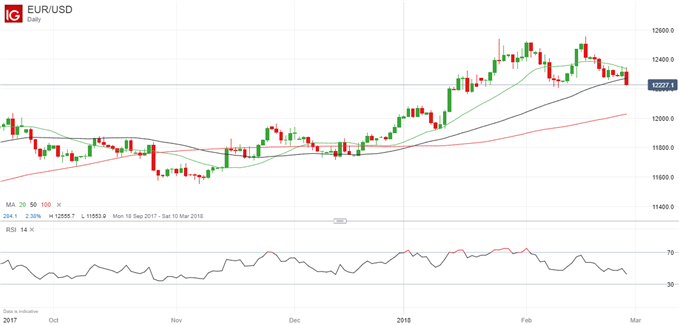Euro talking points:
- A rise in core inflation in Germany and a sharp increase in Spanish inflation suggest the risk to Wednesday’s Euro-Zone inflation figures is to the upside.
- However, subdued inflation expectations despite strong economic growth mean the ECB will remain cautious about tightening monetary policy this year.
- The result could be a firmer Euro near-term but a weaker currency longer-term.
Learn how to trade like an expert by reading our guide to the Traits of Successful Traders
New to forex and want to find out more about trading EUR? Take a look at our Forex Trading Guides
German core inflation rising
Preliminary figures for German inflation in February, released Tuesday, showed a sharper fall than expected, with the rise in the consumer price index slipping to 1.4% year/year from 1.6% rather than the 1.5% predicted – driven down by lower energy and food prices. However, there are two reasons why data for the Euro-Zone as a whole, to be released Wednesday, could be higher rather than lower than forecast.
First, the core measure of German inflation was slightly higher at 1.6%, according to Germany’s Commerzbank, which estimates the core rate on the basis of results from the Federal states. Second, the “flash” estimate of Spanish inflation in February came in at 1.2%, well above both the predicted 0.9% and the previous month’s 0.7%.
Implications for Euro-Zone inflation
Taken together, the German and Spanish numbers imply that Wednesday’s Euro-Zone consumer price index estimate for February could be above the 1.2% rise year/year predicted; perhaps unchanged from January’s 1.3%.
If so, the Euro would likely strengthen as the data might perhaps persuade the European Central Bank to tighten monetary policy earlier than currently forecast. However, when the ECB meets on Thursday next week to decide on policy, it will still likely conclude that it should remain cautious about tightening policy too quickly while inflation remains so low, and that will likely put the Euro under some downward pressue longer-term.
EURUSD Price Chart, Daily Timeframe (September 19, 2017 – February 27, 2018)

I shall be hosting a live webinar on the Euro-Zone inflation data at 0945 GMT Wednesday. Please sign up and join me.
Separate figures released Tuesday suggested that the Euro-Zone economy remains buoyant, with business climate, economic confidence and services confidence data all exceeding expectations in February. However, inflation expectations remain subdued, and that is likely to be a more important consideration for the ECB and add to the pressure on it to tighten policy only gradually – a long-term negative for the Euro.
--- Written by Martin Essex, Analyst and Editor
Feel free to contact me via the comments section below, via email at martin.essex@ig.com or on Twitter @MartinSEssex
For help to trade profitably, check out the IG Client Sentiment data



